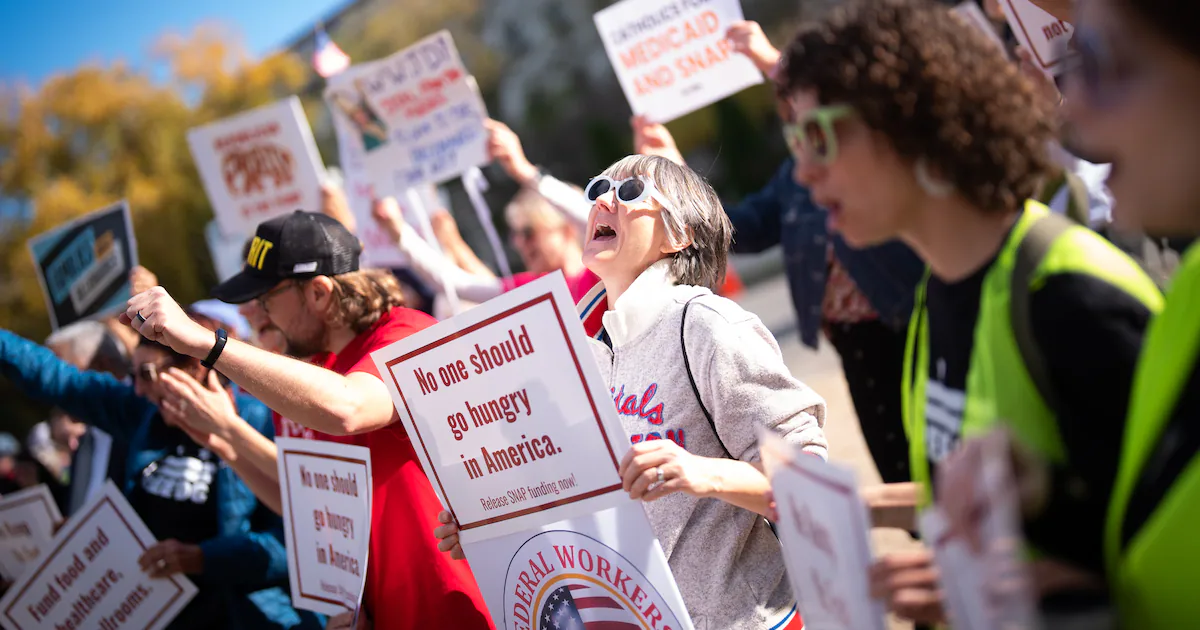Copyright Anchorage Daily News

The government has been closed for a full month - and federal workers who have missed two paychecks are now using credit cards to pay their bills, visiting food pantries to stock their kitchens and reviewing their bank accounts, plotting exactly how long they can manage without a salary. The answer is not much longer for Cynthia Brown, a Government Publishing Office staffer who has been working without pay. The 53-year-old said she is barely eating, subsisting on coffee and protein shakes. She said she has already sold everything she could find in her house, including two old iPhones, and started a GoFundMe to help cover her expenses. She had hoped to drive for DoorDash to supplement her income, but her car was repossessed after she missed a loan deadline because of the shutdown. Brown spends her days ensuring that the government keeps a record of congressional proceedings, so she has closely followed the debate around reopening. And that has only made her situation - and the nation’s - feel more dire, she said: “It is going nowhere. That is what scares me. They are not making any progress.” Starting to cry, Brown added, “They hate each other so much, and we - we are just caught in the middle.” Federal funds ran out Oct. 1 after lawmakers failed to approve an extension as Democrats and Republicans clashed over health care policy. Democratic lawmakers want to extend subsidies for Affordable Care Act health insurance plans before they will agree to reopen the government. Republicans say they won’t negotiate on health care until the government has reopened. Starting this weekend, the impasse will also generate direct consequences for millions of Americans who rely on federal food stamps or send their children to government-funded health and education programs for low-income families. Money for both initiatives - the Supplemental Nutrition Assistance Program, or SNAP, and Head Start - was supposed to go out Nov. 1. But the Trump administration says the shutdown means payments cannot be made. Two federal courts ruled Friday that officials must make at least partial payments, but the exact timing isn’t clear. [Uncertainty over federal food aid deepens as the shutdown fight reaches a crisis point] Without SNAP, federal worker Clarissa Browning isn’t sure what she’ll do. Browning, a Social Security claims specialist in Sacramento and an AFGE Local 3172 union representative, said her disabled sister and daughter live with her and rely on food stamps. She was already scraping to pay for groceries. Her husband was recently laid off, and now her household will have no way to pay for food. “It’s a double blow,” Browning said. “We’ve tapped out of everything we have.” Of the nation’s 2.1 million federal workers, more than 750,000 have been furloughed - sent home without pay - for a full month. Hundreds of thousands more are working without a salary, even as President Donald Trump has found ways to pay some law enforcement agents and active-duty military personnel. Adding to some workers’ anxiety, the administration is threatening to deprive furloughed staffers of back pay, even though Trump signed a 2019 law during his first term guaranteeing it after the last shutdown. James Kirwan, 31, is among those who could be at risk. He has been furloughed from his job as a lawyer at the National Labor Relations Board since the shutdown began. Facing mounting utility bills, food expenses, rent and $160,000 in student loans, Kirwan recently canceled a trip to Chicago for a close cousin’s wedding. “I could probably go through another couple of weeks before I’m going to have to take on serious credit card debt. Serious loans,” he said. Still, Kirwan said he feels lucky: Many federal workers are in far more precarious positions. About one-sixth of the federal workforce in the executive branch makes less than the median national salary of about $62,000, according to a Washington Post analysis of available federal data. The Federal Employee Education and Assistance Fund, a nonprofit that was offering $150 microgrants to federal workers since their first paychecks halted, said it was forced to stop accepting applications this week. The group had received more than 10,000 requests and was nearing its funding limit of $1 million, it said. Most people who applied for grants were still working without pay, said Robyn Kehoe, the group’s executive director, and many were using the money for groceries. The average salary of those who got help was just over $50,000, Kehoe said. “Like many of their fellow Americans, these workers live paycheck to paycheck, and they cannot keep up with their basic living needs right now,” Kehoe said. One Social Security staffer in the Northeast noted that her family of five - three children and a spouse - is almost wholly reliant on her roughly $100,000 income. The staffer, like others interviewed for this article, spoke on the condition of anonymity for fear of retribution. Her husband has a job, but it pays far less than her government position, she said: Her salary is what enabled the family to afford an apartment. As she keeps working without pay, she has begun using credit cards to pay her bills. She is buying only the cheapest groceries: no meat, mostly frozen dinners and frozen pizza. Her family recently sat down for a dismal discussion, at which she informed the children that they wouldn’t be doing much of anything for Thanksgiving and that Christmas would bring exactly one gift per person. This week, without her asking, a kind cousin sent her a check representing about a week’s worth of pay, she said. Until that arrived, she had no idea how she was going to pay her October rent. “I don’t know what I will do next month,” she said, adding that, for the past few days, she has spent most of her nonworking hours sleeping or crying. “Usually, I am the kind of person who will have backup plans, and right now, there isn’t one. I am so scared.” In some workplaces, employees are banding together to help one another. At the Social Security field office in Albany, New York, workers set up a makeshift donation table to share household supplies, said Jessica Sweet, a claims specialist and union representative for AFGE Local 3343. Among the recent offerings were mac and cheese, oatmeal, and canned soup, she said, along with a sheet of paper that workers can fill out to anonymously request necessities. “We’re trying to support each other through all this,” she said, noting that some colleagues are considering leaving civil service altogether. “It’s getting scary.” Sweet herself has stopped buying meat and switched out fresh produce for frozen vegetables. As the shutdown stretches on, she is wondering whether she should apply for a gig job that she can work nights. But other union members, she said, are warning that it’s hard to find businesses willing to hire federal workers who will probably quit once the government reopens. In Kansas City, a furloughed employee of the Department of Housing and Urban Development is casting around for a second job. He said his wife and he have stopped eating out, canceled their streaming services, and nixed all travel or driving that isn’t necessary. Still, he had to dip into his savings to pay rent last month - and he’s scrambling to find another source of income to avoid draining down everything they’d socked away. He has applied to a driver delivery service called Roadie, he said, and to a nearby shop that sells sports gear. “I will do pretty much anything I need to support me and my wife,” he said. “I will work retail, drive for Uber, work at a grocery store for a little bit if I have to.” Some federal workers are still looking out for others, despite the crunch. “A lot of people are going to be going hungry,” said Charlotte Slaiman, an antitrust attorney at the Federal Trade Commission who has been furloughed for all of October. Like other federal workers interviewed for this article, Slaiman said she was speaking in her personal capacity. Worried about so many people in the D.C. region facing financial pressures, Slaiman and her 17-month-old daughter arrived Thursday at a SNAP benefits protest outside the Agriculture Department carrying donations for local food banks: cans of black beans and crushed tomatoes, tortillas, chicken stock and a bag of rolled oats. She also made a $100 donation to the Capital Area Food Bank. “It’s a drop in the bucket,” she said, but she wanted to help. Therapy sessions have helped one furloughed State Department staffer and his unemployed wife. Like others, the couple have shaved off every expense they could, and they’re now using their savings to support their two children, one in day care and one in kindergarten. The constant background worry about money and his job, the staffer said, has left him and his wife feeling grumpy. Sometimes, that boils into fights about nothing - but the therapist is helping with that. The couple are learning to take a breath, to recognize that “our worries are due to things that are out of our control, not each other,” he said. But at the last therapy session, the staffer came to an uncomfortable realization: He probably couldn’t afford the treatment much longer. “I kind of need to cut that soon,” he said. “I warned the therapist.” - - -



